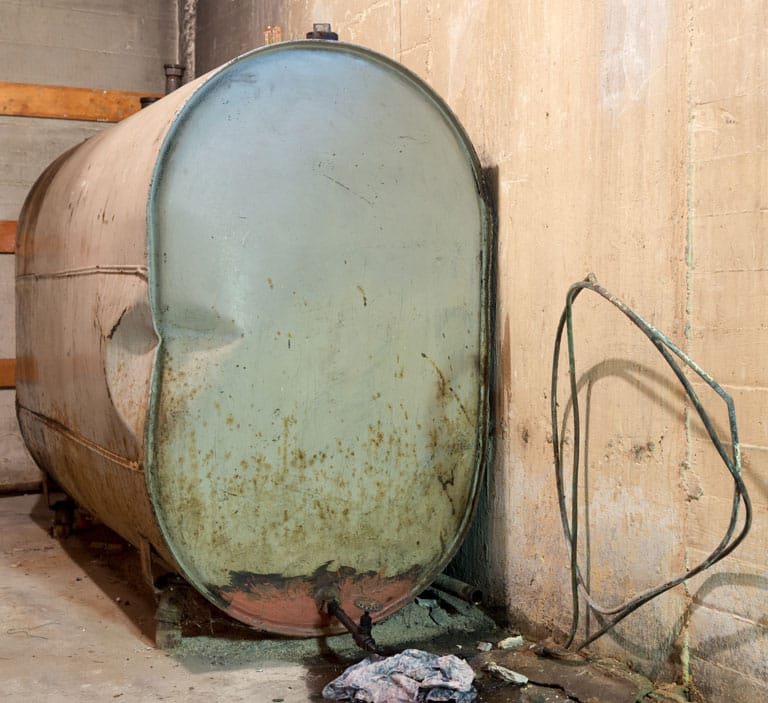The hum of a furnace on a cold evening can provide satisfaction for a large number of homeowners. In many cases, the oil tank – the unnoticed hero behind that warmth – is not noticed until a problem arises. But proactive maintenance, like oil tank replacement, is crucial for your home’s safety and efficiency. We’ll help you understand the costs for replacing the oil tank, and assist you in making an informed choice on this vital investment for your home.

The Importance of Oil Tank Maintenance: Avoidance is crucial
Many homeowners do not realize the significance of oil tank maintenance. A functioning oil tank is crucial to the structure of your house. As responsible homeowners, ensuring your heating system and oil storage tank function properly and in a safe manner is vital. A seemingly small oil leak in the moment can quickly become a major financial and environmental burden after.
Understanding Average Costs: A 275 Gallon Case Study
It’s all about knowledge, especially when planning budgets for home maintenance projects. Consider how much it costs to replace an oil tank with 265 gallons, which is the most popular size. In states such as Massachusetts, New Hampshire, Rhode Island, and Connecticut the average cost is approximately $3,600. It’s important to know that this cost assumes a straightforward replacement in an outside or basement area that doesn’t have any significant accessibility issues.
Beyond the Price Tag Reasons to Consider Oil Tank Replacement is an investment
The cost of replacing your oil tank may appear expensive at first but it’s an investment in your home’s safety and security in the long-term. Here’s why:
Safety First: Oil tanks which are older can leak and pose a risk of fire. They could also lead to environmental contamination. This risk can be eliminated through the replacement of your tank, giving you and your family peace of assurance.
Maximized Efficiency: Older oil tanks can become less efficient over time and will require more frequent oil delivery to ensure warmth. Newer tanks are much more efficient, and could decrease your heating expenses in the long run.
Enjoy Peace of Mind You can relax knowing that a new tank will offer years of reliable service. It also takes away any worries about sudden breakdowns or leaks in the winter months.
Oil Tank Replacement Costs: What are the factors that affect their cost?
A 275-gallon replacement tank will cost around $3,600. This is a great starting point. The final cost can be affected by several factors:
Tank size: It’s obvious that larger tanks are more expensive to replace.
The tank’s location: It’s more expensive remove and replace a tank that is buried underground than a tank located in an easily accessible crawlspace or basement.
Accessibility Issues Tank Accessibility: If the existing tank is not accessible due to the proximity of structures or narrow spaces, costs of labor associated with its removal and the installation will go up.
The correct disposal of an old tank can incur additional charges.
Planning for Your Home’s Future Plan for Oil Tank Replacement
Oil tanks have an time of between 15 to 30 years based on various variables. Knowing the approximate date of the tank’s life allows you to proactively budget for replacing it before issues occur. You might want to schedule an inspection with a professional so that you can receive a precise estimate on the cost of a replacement.
Investing in Your Home’s Safety and sustainability
It’s not just about being warm and cozy; changing your oil tank is also an investment in the future of the planet. Tanks that are older can be leaking and can contaminate soil as well as groundwater. Modern oil tanks adhere to stricter environmental regulations. This assures a responsible storage of oil while minimizing environmental harm.
Knowledge is Power: Take Charge of Your Home’s Health
You can make informed decisions regarding your home’s maintenance needs by knowing the costs involved in replacing your oil tank. When you focus on proactive tank replacement to ensure you have a secure and efficient as well as environmentally responsible heating system that will last for years to be to. Don’t be caught off guard when you encounter an oil tank problem during the winter months. You’ll be able to relax your mind and remain warm through planning and budgeting this crucial home maintenance task.